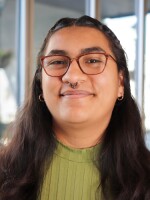The Walker’s Square Farmers Market returned to Milwaukee’s south side this growing season after five years away from the community. Its return brought live music, coffee, food and, of course, fresh vegetables to the neighborhood.
The market has 10 different produce vendors, most of whom are Hmong families serving the majority Hispanic neighborhood. That has opened a cultural exchange between Hmong farmers and Walker’s Square residents.
At the Walker’s Square Farmers Market, Fong Chang paces in front of his produce stand, arranging piles of bok choy, daikon radish and cilantro as the square fills with potential customers. Ue Xiong hovers in the back, prepping and arranging her homegrown flowers into bouquets bursting with color. Their adult children fan out, helping customers and talking to other vendors — catching up, connecting and laughing.

Farming has always been a part of Fong Chang and Ue Xiong's life. Kia Chang, their daughter, helps translate.
"Back in the mainland like Laos and Thailand they started farming when they're around like 5, 6 [years old]. So it has been a tradition since then. It's something that they have been doing as a little kid with the parents, so that's all they know and that's what they have been doing,” says Kia Chang.
The family is no stranger to farmers’ markets, selling in the past in New Berlin, Waukesha and West Allis, but it is their first year selling to the Walker Square neighborhood.
The neighborhood is majority Hispanic, and the produce vendors are mostly Hmong. Kia Chang says they have learned about the local community's food preferences and the similarities they share.
“Honestly, I feel like selling here, we actually learned that we have more in common, and vegetables, yeah so it was it's kind of interesting that a lot of like the I know that it's mainly Hispanic, but they tend to know more of the greens that my parents they sell,” says Kia Chang.
Selling at the Walker Square Market has led the family to reflect on how their produce is received in the various locations they serve. They say they do less explaining in Walker Square, their customers already know how to use vast arrays of chiles, squash, greens and other veggies that line the family's tables.

Fong says that the family is also learning more about how they can better serve their customers by growing the produce they request. When they first arrived in the United States, finding foods that fit their diet meant either growing their own, finding it from other vendors of similar backgrounds or searching for Asian grocery stores. Now they are in the position to be that source of important foods for others.
”So my dad just want to add that coming here is actually a learning experience because we do have customers that come and look for certain things that we do have at the garden that we perceive as weed you know but they're like, 'Oh no, we want this, you know.' And sometimes even if like the language barrier they do show us pictures of the vegetables that they're looking for and my parents, they do go out of their way to look for it, you know, as far as seeds and I'm trying to grow for next year for our customer,” says Kia Chang.
For example, they say they considered plants like purslane a weed, but now they know it’s a valued ingredient for some customers.
“Again, my parents, they never had that before. They think that's a weed where our customer comes to look for it and we're like we have a ton of that at the garden. You want it! We can bring it! ... It's also a learning experience for my parents,” says Kia Chang.
For Fong Chang, Ue Xiong and their daughter, selling to farmers markets has been a way to keep their own traditions alive. Starting this year at a new market has opened up a new way to appreciate the similarities — and differences — between cultures.






